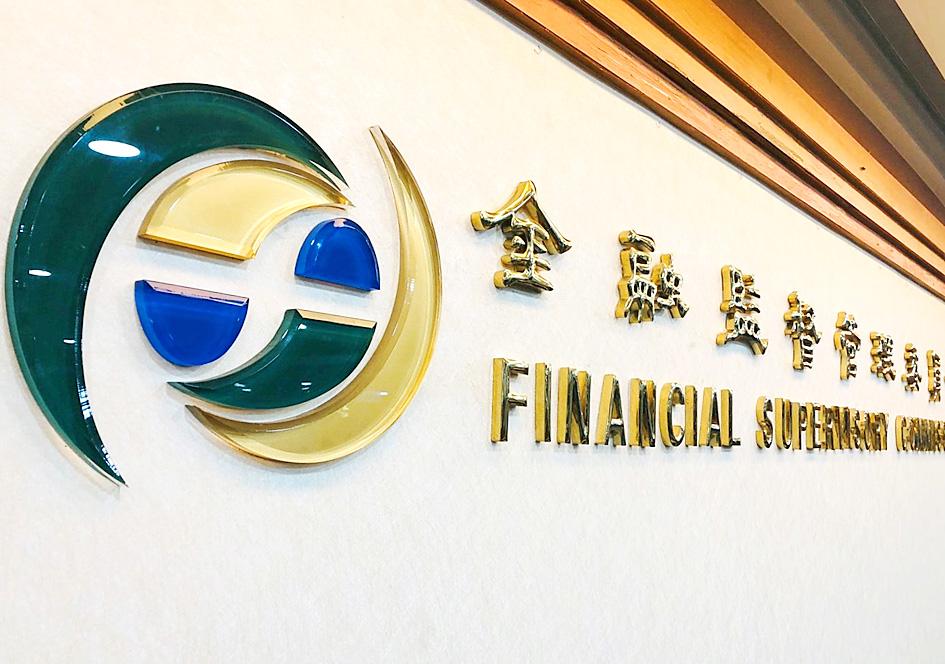Amendments to the Financial Consumer Protection Act (金融消費者保護法) took effect on Friday, raising compensation benchmarks to NT$1.2 million (US$43,265) for investment-linked products and NT$120,000 for non-investment products, from NT$1 million and NT$100,000 respectively.
The rising benchmark hike follows changes in inflation and economic growth, and aims to enhance consumer protection, the Financial Supervisory Commission said.
Under the new regulations, after the Financial Ombudsman Institution (FOI) reviews a consumer complaint regarding a financial product or service, and determines appropriate compensation, the company should accept its decision without ability to appeal.

Photo: Kelson Wang, Taipei Times
The products include securities, trusts, funds, derivatives, gold, foreign securities, futures and investment-linked insurance policies, the commission said on Thursday.
In disputes regarding non-investment products, such as medical insurance, the financial company must accept the FOI’s decision when it involves compensation of NT$120,000 or less under the new regulations, the commission said.
The commission announced drafts of the amendments last month and did not receive any objections from companies in the financial sector, Hsu Tsui-wen (徐萃文), head of the commission’s legal department, said at a news briefing.
In the past few years, about half of the complaints did not require a review by the FOI, as consumers and financial companies had reached settlements before the cases moved into the review stage, the FOI said.
Among the remaining complaints, about half were withdrawn by consumers and one-quarter were resolved privately before FOI involvement, leaving the roughly one-quarter of remaining complaints to go forward to the FOI for a decision, the commission’s data showed.
The new regulations are not retroactive, and an FOI decision is binding only for financial companies, the commission said.
If a consumer believes that the amount of compensation is insufficient, they can reject the offer, request further negotiations or take legal action, it said.

China’s Huawei Technologies Co (華為) plans to start mass-producing its most advanced artificial intelligence (AI) chip in the first quarter of next year, even as it struggles to make enough chips due to US restrictions, two people familiar with the matter said. The telecoms conglomerate has sent samples of the Ascend 910C — its newest chip, meant to rival those made by US chipmaker Nvidia Corp — to some technology firms and started taking orders, the sources told Reuters. The 910C is being made by top Chinese contract chipmaker Semiconductor Manufacturing International Corp (SMIC, 中芯) on its N+2 process, but a lack

NVIDIA PLATFORM: Hon Hai’s Mexican facility is to begin production early next year and a Taiwan site is to enter production next month, Nvidia wrote on its blog Hon Hai Precision Industry Co (鴻海精密), the world’s biggest electronics manufacturer, yesterday said it is expanding production capacity of artificial intelligence (AI) servers based on Nvidia Corp’s Blackwell chips in Taiwan, the US and Mexico to cope with rising demand. Hon Hai’s new AI-enabled factories are to use Nvidia’s Omnivores platform to create 3D digital twins to plan and simulate automated production lines at a factory in Hsinchu, the company said in a statement. Nvidia’s Omnivores platform is for developing industrial AI simulation applications and helps bring facilities online faster. Hon Hai’s Mexican facility is to begin production early next year and the

Who would not want a social media audience that grows without new content? During the three years she paused production of her short do-it-yourself (DIY) farmer’s lifestyle videos, Chinese vlogger Li Ziqi (李子柒), 34, has seen her YouTube subscribers increase to 20.2 million from about 14 million. While YouTube is banned in China, her fan base there — although not the size of YouTube’s MrBeast, who has 330 million subscribers — is close to 100 million across the country’s social media platforms Douyin (抖音), Sina Weibo (新浪微博) and Xiaohongshu (小紅書). When Li finally released new videos last week — ending what has

TECH BOOST: New TSMC wafer fabs in Arizona are to dramatically improve US advanced chip production, a report by market research firm TrendForce said With Taiwan Semiconductor Manufacturing Co (TSMC, 台積電) pouring large funds into Arizona, the US is expected to see an improvement in its status to become the second-largest maker of advanced semiconductors in 2027, Taipei-based market researcher TrendForce Corp (集邦科技) said in a report last week. TrendForce estimates the US would account for a 21 percent share in the global advanced integrated circuit (IC) production market by 2027, sharply up from the current 9 percent, as TSMC is investing US$65 billion to build three wafer fabs in Arizona, the report said. TrendForce defined the advanced chipmaking processes as the 7-nanometer process or more